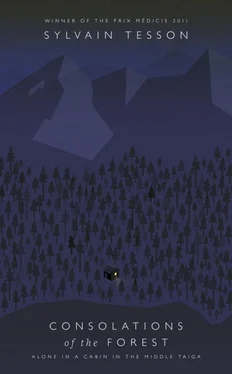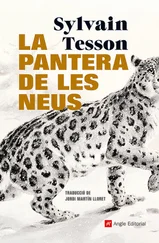Outdoors, chaos. The wind is carving the snowdrifts with its teeth. Gusts are giving the edge of the forest a whipping. The cedars are in the front line, taking their punishment. Torn branches sail over the crowns of the trees, which the tempest seems bent on uprooting. A sad force, the wind, labouring in vain. Watching this fury with a good smoke, warm by the stove, is one definition of civilization.
In the evening, I slowly get drunk. The cabin: a cell of inebriation.
9 APRIL
Still storming. Inexhaustible, the wind, leading the assault against the skirt of the forest. Why this thirst for revenge? Its rage against what endures… The lake, perfectly polished, gleams, stripped of all snow. I go for a little walk on the ice, pushed along by the wind. A blast tears off my shapka, which whirls out of sight in ten seconds, carried off at sixty miles an hour. I’m almost two miles out on the lake. I rig up a turban from my scarf and pull my hood down tight. I hadn’t anticipated having so much trouble getting back to the shore without crampons, going against the wind. I have to get down on my knees to offer less resistance. I progress by wedging my feet into the edges of cracks. Crawling across a frozen lake, bowed down before a storm, is a lesson in humility.
With a few more miles-per-hour, the wind would sweep me off to the middle of the lake like a hockey puck, forcing me to go ask for help on the other shore, fifty miles away in a village in Buryatia: ‘Hello, pardon me, the wind just blew me in.’
Tonight the cabin creaked in every joint, adding the moans of the wood to the explosions of the ice. If I were superstitious, I’d be aghast at the noise.
Trapped, I’m angry. And calm down when I read this in Defoe’s Crusoe : ‘The 24th [December]. Rain all day all night, no stirring about for me.’
10 APRIL
Dawn revealed a cold, blue day. The lake, washed. The world is new, burnished by forty-eight hours of fury. I drink my tea outside, at my table, in the refreshed atmosphere. Not a breath of wind. I detect a muffled humming, the tinnitus of solitude.
A visit to my wooden crates. My supplies are dwindling. I have enough pasta left for a month and Tabasco to drench it in. I have flour, tea and oil. I’m low on coffee. As for vodka, I should make it to the end of April.
In the afternoon, I try out a new fishing spot an hour’s tramp to the north, at the mouth of a little river, below a slope covered with sturdy conifers. The hole doesn’t produce much: an hour to catch one char. I stay there until dusk, sitting on the stool, waiting for a twitch on the line. Fishing: the last clause in the pact signed with time. If you go home empty-handed, it means that time made the only catch of the day. I’m willing to spend hours sitting still. All that patience might bring me a fish. If not, too bad; I won’t be angry at those hours for my disappointment. There aren’t that many activities that risk being reduced to a vague hopefulness. Personally, I don’t believe in messiahs any more, and will await the coming only of fish.
In the evening, after dealing with the sole char of the day, I finish Crusoe and begin Justine, or, The Misfortunes of Virtue . These two books should be read together. Not in order to imagine Justine arriving on a castaway’s island, but because Robinson tries to re-create civilization and reinvent morality, whereas the Marquis de Sade tries to dynamite the former and soil the latter. Two servants of culture at opposite ends of the spectrum.
11 APRIL
After an overnight lull, the wind has doubled in strength. At two in the afternoon, it dies down again. The clouds open, soaking Baikal in sunshine. When a cloud counterattacks, the ice grows dull, and areas still bathed in light become striped with shadows. The grey knife blade gains ground, sliding over the ivory; the sun regroups, breaks through, and darkness ebbs away. The light is playing at games of wind and chance.
Amid all this mottling, four points stand out. My binoculars reveal some people on bicycles. For a moment I consider putting out the stove to keep the chimney from revealing my presence, but then feel ashamed of that thought.
They have passed Middle Cedar Cape and have altered course. They’re coming towards me. They’ll be here in twenty minutes.
Sergei, Ivan, Svieta and Igor work in the hydroelectric plant in Bratsk. During their winter holiday, they get on their bikes and ride along the frozen trails. I serve them tea; they unpack quantities of cold cuts and a huge jar of mayonnaise, which they carefully spread on every slice of sausage.
‘Would you like more tea?’ I ask.
‘No,’ replies Igor, dipping a sausage in the mayonnaise. ‘We’re going to have lunch in Elohin in about an hour.’
‘You’ve got a lot of titmice around here,’ remarks Svieta.
‘Yes. They’re my friends and they’re teaching me Russian.’
They give me strange looks, and eventually pack up to leave.
12 APRIL
I’m going to Elohin. I felt like having one of those banyas Volodya knows how to prepare, with the temperature at 200°F and beer to drink outside, our bodies steaming under the wooden awning as we look out at the mountains. En route, two hours north of my cape, I leave my sledge at the mouth of a frozen river that slices through the forest with its icy blade. The crampons are gripping well and I climb up from 2,600 feet through walls of schist bristling with denuded fir trees. The surface is only a bridge: I can hear water running beneath the vault. Red saplings grow along the edges, and their frozen debris streaks like blood through the crystal body of the ice. Winter is a vice.
From the lower river, it’s still a little over seven miles to Elohin. Some wide faults force me to make many detours, seeking a way through the labyrinth of gaps and sometimes leaping over the fissures. Gusts of wind chivy along snaking lines of fine snow. I like walking on ice; in moonlight, it’s one of the few places where you can be sure you won’t be crushing little critters. The perfect terrain for those Jain priests who strive not to harm the tiniest gnat…
The veins in the ice. Like following the thread of a thought. If nature thinks, landscapes express the ideas. We ought to draw up a psychophysiology of ecosystems by attributing an emotion to each one. There would be the melancholy of forests, the joy of mountain torrents, the hesitation of bogs, the strict severity of peaks, the aristocratic frivolity of lapping waves… A new discipline: the anthropocentrism of landscapes.
Volodya teases me when I show up at his door.
‘You didn’t bring any flowers for Irina?’
‘Offering women flowers is a heresy. Flowers are obscene sex organs, they symbolize ephemerality and infidelity, they spread themselves wide open at the roadside, on offer to every passing breeze, the mouth parts of insects, clouds of seeds and the teeth of animals. They’re trampled, picked and sniffed by noses. One should bring the woman one loves stones, fossils, some gneiss; I mean something that lasts for ever and won’t wither and fade.’
That’s what I would have liked to reply to Volodya, but my Russian is too weak so I say: ‘Yes, I did have some, but they shrivelled on the way. The banya, Volodya: it’s ready?’
‘It’s waiting for you, pal.’
That evening, I sit on the bench with Volodya’s cat on my lap and watch Buryatia’s lights go out. It’s 10°F; the horizon is a sheet of satin. A snapping noise makes the cat’s ears prick up; a dog barks.
Eleven o’clock. Volodya hasn’t turned off the radio. I’m lying on the floor in the toasty cabin; we’re listening to the main station. They announce the disaster. The Polish government’s Tupolev jet has crashed near Smolensk. The Polish president and dozens of officials are dead. It seems there were no survivors. The plane was bringing a Polish delegation to a ceremony in honour of the victims of the Katyn Forest massacre, for which Moscow has finally agreed to admit responsibility.
Читать дальше












